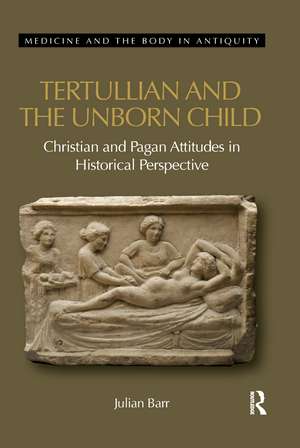Tertullian and the Unborn Child: Christian and Pagan Attitudes in Historical Perspective: Medicine and the Body in Antiquity
Autor Julian Barren Limba Engleză Paperback – 30 iun 2020
| Toate formatele și edițiile | Preț | Express |
|---|---|---|
| Paperback (1) | 385.84 lei 6-8 săpt. | |
| Taylor & Francis – 30 iun 2020 | 385.84 lei 6-8 săpt. | |
| Hardback (1) | 846.50 lei 6-8 săpt. | |
| Taylor & Francis – 23 feb 2017 | 846.50 lei 6-8 săpt. |
Preț: 385.84 lei
Nou
Puncte Express: 579
Preț estimativ în valută:
73.83€ • 77.29$ • 61.09£
73.83€ • 77.29$ • 61.09£
Carte tipărită la comandă
Livrare economică 05-19 aprilie
Preluare comenzi: 021 569.72.76
Specificații
ISBN-13: 9780367595340
ISBN-10: 0367595346
Pagini: 208
Dimensiuni: 156 x 234 x 15 mm
Greutate: 0.36 kg
Ediția:1
Editura: Taylor & Francis
Colecția Routledge
Seria Medicine and the Body in Antiquity
Locul publicării:Oxford, United Kingdom
ISBN-10: 0367595346
Pagini: 208
Dimensiuni: 156 x 234 x 15 mm
Greutate: 0.36 kg
Ediția:1
Editura: Taylor & Francis
Colecția Routledge
Seria Medicine and the Body in Antiquity
Locul publicării:Oxford, United Kingdom
Cuprins
Preface
Introduction
Chapter 1: Rhetoric and the Unborn
Chapter 2: The Christian Context
Chapter 3: Tertullian’s Understanding of Prenatal Biology
Chapter 4: The Pagan Context
Conclusion
Bibliography
Index
Introduction
Chapter 1: Rhetoric and the Unborn
Chapter 2: The Christian Context
Chapter 3: Tertullian’s Understanding of Prenatal Biology
Chapter 4: The Pagan Context
Conclusion
Bibliography
Index
Notă biografică
Julian Barr is a research fellow at the University of Queensland, where he completed his PhD in classics. He tutors ancient history and classical languages. His research interests include early Christianity, ancient medicine, and the Roman family.
Descriere
Tertullian of Carthage was the earliest Christian writer to argue vigorously against abortion. This book is the first comprehensive analysis of his attitude towards the foetus and embryo. It is argued that Tertullian's comments on the unborn should be read as rhetoric ancillary to his primary arguments, none of which related directly to abortion







